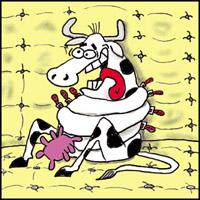Possible treatment of spontaneous encephalopathy
2001/03/02 Imaz Amiano, Eneko - Elhuyar Zientziaren Komunikazioa

A team of researchers from the Autonomous University of Barcelona (UAB) has found that in vivo storage is reversible of proteins that cause spontaneous encephalopathies. BSE of mad cows, oily scrapie and human diseases Creutzfeldt-Jacob are diseases of the group of spontaneous encephalopathies. In the opinion of the UAB the possibility of creating treatments to combat the diseases mentioned through the important finding published in the journal European Federation of Biochemical Societes is opened. As well as improving bioindustrial protein recovery processes.
Proteins are long chains of amino acids that bend and acquire different forms and are essential in the regulation of different processes in living beings. The function of each protein is closely related to its form, that is, with its form of folding. If proteins lose their original form, they also lose their function. In the case of spontaneous encephalopathies, prioeis cause a huge accumulation of proteins, thus losing their form and, therefore, their function.
Antonio Villaverde's group has found that the accumulation of proteins in a bacterium is reversible. This means that, under certain conditions, the proteins of the deposits recover the original form and function and accumulation disappears completely. As they have explained, deposits or aggregations disappear on their own due to the cellular mechanisms involved in the refolding of proteins. This opens its doors not only to the healing of spontaneous encephalopathies but also to other diseases caused by the accumulation of proteins. As: Alzheimer, type II diabetes, Huntington syndrome, etc.
Now we have to see if this recovery occurs also in other living beings.

Gai honi buruzko eduki gehiago
Elhuyarrek garatutako teknologia






